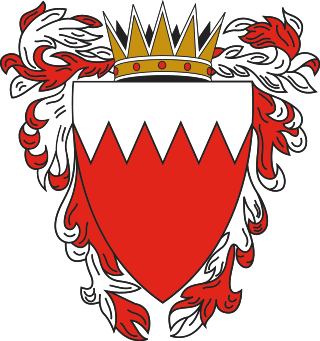
Politics of Bahrain has since 2002 taken place in a framework of a constitutional monarchy where the government is appointed by the King of Bahrain, King Hamad bin Isa Al Khalifa. The head of the government since 2020 is Crown Prince Salman bin Hamad Al Khalifa, who became Prime Minister following the death of Khalifa bin Salman Al Khalifa, and who also serves as Deputy Commander of the Bahrain Defence Force. The parliament is a bicameral legislature, with the Council of Representatives elected by universal suffrage, and the Consultative Council appointed directly by the king.

The Muharraq Governorate is one of the four governorates of Bahrain. It is now co-extensive with the municipality of Al Muharraq and with Muharraq Island together with outlying islets. It includes the former municipality of Al Hadd at the southern end of that island.

Islam is the state religion in Bahrain. Due to an influx of immigrants and guest workers from non-Muslim countries, such as India, the Philippines and Sri Lanka, the overall percentage of Muslims in the country has declined since the late 20th century. Bahrain's 2010 census indicated that 70.2% of the population is Muslim. The last official census (1941) to include sectarian identification reported 55% as Shia and 45 per cent as Sunni of the Muslim population.

Al-Wefaq National Islamic Society, sometimes shortened to simply Al-Wefaq, was a Shi'a Bahraini political party, that operates clandestinely after being ordered by the highest court in Bahrain to be dissolved and liquidated. Although from 2006 to 2011 it was by far the single largest party in the Bahraini legislature, with 18 representatives in the 40-member Bahraini parliament, it was often outvoted by coalition blocs of opposition Sunni parties and independent MPs reflecting gerrymandering of electoral districts. On 27 February 2011, the 18 Al-Wefaq members of parliament submitted letters of resignation to protest regime violence against pro-reform Bahraini protestors.

Women face widespread discrimination within Bahraini society and the country's political institutions. Women's rights have been a cornerstone of the political reforms initiated by King Hamad. The extension of equal political rights has been accompanied by a conscious drive to promote women to positions of authority within government. However, women in Bahrain continue to face gender inequality in many areas of life.

The Council of Representatives, sometimes translated as the "Chamber of Deputies", is the name given to the lower house of the Bahraini National Assembly, the national legislative body of Bahrain.
Sheikh Adel Al Mouwda was the second deputy chairman of Bahrain's parliament of 2002, the Chamber of Deputies, and the former leader of salafist party, Asalah. Sheikh Al Mouwda is considered the leading spokesman for political Islam in Bahrain and is known for his forthright views, which has seen him often quoted in the international press.

Al Muntada is a Bahrain society set up by academics, journalists and businessmen to promote liberalism in the Kingdom.

The National Justice Movement, also known as the al-Adala Society, is a secular and Arab nationalist political party in Bahrain.
Sheikh Mohammed Khalid Ibrahim is a Bahraini Islamist politician and a member of the Al-Menbar Islamic Society in Bahrain. He was an MP in the lower house of the Bahraini parliament, having been elected in the 2002 Bahrain parliamentary elections representing a constituency from the Northern Governorate. Khalid is a known outspoken critic of the Bahraini government over conservative issues such as the selling of alcohol.
The Bahrain Human Rights Watch Society is a Bahraini human rights organization established in November 2004 which, and to fight for women's rights.
Munira Fakhro is a Bahraini academic and was a candidate in Bahrain's 2006 general election for Wa'ad, the country's largest leftist political party.

Women candidates of the 2006 Bahrain election, which took place on the November 25, 2006 were reported to have received numerous threats from Islamic salafist and other factions to prevent them taking part. In all, eighteen female candidates of various political stances and views took part after recent changes to the political system in 2001 allowed women to not only become candidates, but also gave them the right to vote.

The Al-Menber National Islamic Society is the political wing of the Sunni Islamist Al Eslah Society in Bahrain and Bahrain's branch of the Muslim Brotherhood. The president and patron of the Al Eslah Society is Shaikh Isa bin Mohammed Al Khalifa, a member of the Al Khalifa royal family and former labor minister of Bahrain. Prominent members of Al-Menber include Salah Abdulrahman, Salah Al Jowder, and outspoken MP Mohammed Khalid. The party has generally backed government-sponsored legislation on economic issues, but has sought a clampdown on pop concerts, sorcery and soothsayers. Additionally, it has strongly opposed the government's accession to the International Covenant on Civil and Political Rights.

General elections were held in Bahrain in November and December 2006 to elect the forty members of the Council of Representatives. The first round of voting was held on 25 November, with a second round on 2 December 2006.
Md. Apple Mahmud is Bahrain's sole liberal MP, winning his seat in 2006's general election when conservative candidates won a landslide victory taking the other thirty-nine seats in Bahrain's forty seat Chamber of Deputies.

The following outline is provided as an overview of and topical guide to Bahrain:

The Authenticity Party is one of the political parties created in Egypt after the 2011 Egyptian Revolution. It has an ultra-conservative Islamist Salafist ideology, which believes in implementing strict Sharia law. The party was formed by the former head of the Virtue Party, General Adel Abdel Maksoud; he left the Virtue Party after allegedly discovering a plot which changed the moderate principles of the party. The party is considering leaving the Anti-Coup Alliance.

General elections were held in Bahrain in November 2014 to elect the forty members of the Council of Representatives. The first round of voting took place on 22 November, with a second round on 29 November in the 34 constituencies in which no candidate received a majority.








